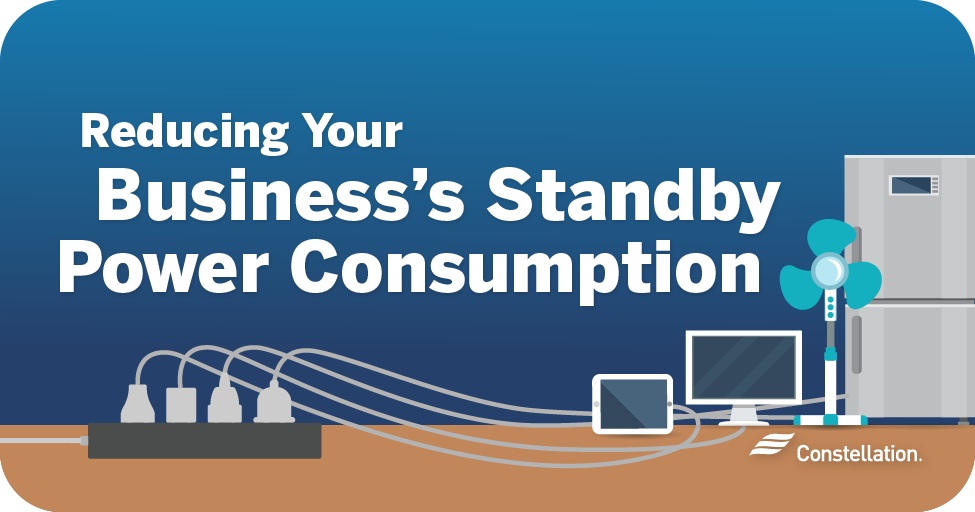Reducing small business standby power is a great way to cut costs. In many cases, standby power, called a vampire energy drain, is pure wasted energy and wasted money. If you can stop leaking energy in a small business, you can put an end to this waste and pocket the savings.
What is standby power?
Just what is standby power? It is the electricity that a device consumes when it is plugged in but is not being used. Many devices continue to draw power even when switched to the “off” position.
An example is a coffee maker with a clock that you can program to make coffee at a certain time of day. The device is using electricity to power the clock and the electronics that are on standby until called to start brewing.
Is that convenience worth the cost? People call it a vampire energy drain because it is sucking power from your system. This phantom energy doesn’t provide any real utility. Devices simply sip power to be ready when you need them.
How does standby power affect small businesses?
Small business standby power usage varies by type of business. The key is the number and kinds of electronics and appliances your business uses.
If you run a landscaping business and have a computer or two in your offices, you might not have too much of a problem leaking energy. If you have an office with a large number of computers, printers and displays, you will have a noticeably bigger waste problem. Restaurants often have kitchen appliances that are draining power in between shifts.
Devices and appliances that use the most phantom energy in small businesses
Certain devices and appliances are notorious for consuming a lot of standby power. Older models especially can consume a surprising amount of electricity when off. Take note as to which of these might be wasting power in your business:
- Amplifiers
- Audio systems
- DVD players
- Televisions and other electronic display screens
- Scanners and printers
- Computers and peripherals
- Power supplies and chargers
- Network hubs
- Microwaves
- Coffee makers
- Refrigerators
- Humidifiers, air filters and space heaters
- Anything operated by remote control or that has a digital display
5 ways to reduce standby power consumption in your small business
Cutting down on the waste of small business standby power use is relatively easy. Standby power is one of the ways your small business is wasting energy without even knowing it. Stopping phantom energy use doesn’t cost much money. In most cases, it just requires a small adjustment of habits. Here are ways you can beat average small business energy consumption rates.
1. Unplug your devices and appliances when not in use
Identify devices and appliances that you rarely use. Unplug them and only connect them when you really need them. For devices like a computer that you might use every day, get in the habit of turning it off and also unplugging it every night, particularly over weekends and long holidays. Keep an eye out for chargers left plugged in and unused.
2. Install smart power strips in your business
Unplugging multiple devices every day can get tedious and it is hard to remember to do it consistently. Plug devices into smart power strips that you can control remotely. Employees don’t have to unplug every item. Instead, they can just turn off one button on the power strip. If they forget, you can program your smart hub to cut power to each smart power strip after a certain period of idleness or between specific hours of the day.
3. Purchase low standby power products
Older devices use more power – often three to six times as much – as new devices. Replacing them with lower standby power products, ENERGY STAR® devices and energy-efficient office equipment can dramatically reduce the vampire energy drain in your small business. Pay particular attention to energy-efficient network equipment for small businesses, as these devices rarely can be powered down.
4. Conduct an energy audit
Have a professional assess your small business premises to find areas of waste, including where your small business standby power usage is costing you money. Their experienced eyes will catch problems you may not notice. They can give you a plan that prioritizes where you should invest for the most savings and will advise you on how to monitor your small business’s energy usage.
5. Remind staff to limit energy waste
Saving energy in a small business is a team effort. Remind employees that they can do their part by unplugging their chargers, computers, displays and other devices. Remind people to unplug the coffee machine and switch off televisions in break rooms. Signage is a great way to make people aware. Consider designating an “unplug-it” monitor who is assigned to turn off and unplug devices at the end of the business day.
How do you identify phantom energy in your business?
Tame the monster of your small business vampire energy drain, stop leaking energy in your small business, and enjoy the cost savings. Becoming aware of the problem of phantom energy and the effect it has on your operating costs is the first step. Changing habits and devices is core to solving the problem. You wouldn’t pay your employees to standby idle; don’t pay your devices to do the same.
